Table of Contents
Discover why life on Animal Farm falls short of utopia in this thought-provoking analysis of George Orwell’s classic allegory.
Animal Farm, a novel by George Orwell, tells the story of a group of farm animals who rebel against their human farmer, Mr. Jones, and establish their own self-governing society. However, as the story unfolds, it becomes clear that life on Animal Farm is not as idyllic as it initially seemed. Despite their efforts to create a utopian society, the animals soon realize that they have merely exchanged one form of oppression for another. Indeed, life on Animal Farm is fraught with challenges and difficulties that threaten to undermine their hard-won freedom.
From the outset, it is clear that the animals are struggling to adapt to their new way of life. Although they are no longer subject to human exploitation, they are now forced to work harder than ever before to maintain their farm. Moreover, they are constantly battling against hunger, disease, and other threats that jeopardize their survival. As the pigs, who have taken over leadership of the farm, become increasingly corrupt and authoritarian, the other animals begin to feel marginalized and oppressed. Ultimately, it becomes clear that life on Animal Farm is far from the idealistic vision that its founders had hoped for.
Despite their many setbacks, the animals remain determined to make their new society work. However, as the novel progresses, it becomes apparent that their efforts are doomed to failure. Whether due to greed, corruption, or incompetence, the leaders of Animal Farm are unable to provide for the needs of their constituents. As a result, the animals are forced to endure a life of poverty, hardship, and oppression. Although they continue to cling to the hope that things will improve, it is clear that their situation is unlikely to change anytime soon.
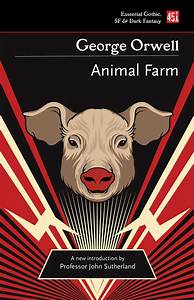
George Orwell’s Animal Farm is a classic allegorical novel that depicts the rise and fall of a socialist state. It uses animal characters to show how power corrupts those who wield it and how the struggle for power can lead to oppression and exploitation. The novel has been widely acclaimed for its insightful commentary on politics, society, and human nature. However, life on Animal Farm is not as good as it may seem, despite the initial promise of equality and justice. In this article, we will explore why life is not as good on Animal Farm.
The False Promise of Equality
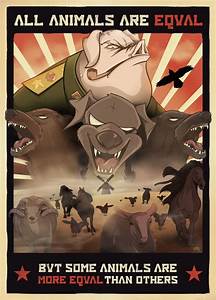
At the beginning of the novel, the animals rebel against their human oppressors and establish a new system of government based on the principles of equality and democracy. The pigs, who are the most intelligent animals, take charge of the revolution and promise to create a society where all animals are equal and free from oppression. However, this promise turns out to be false, as the pigs gradually seize power and establish themselves as the ruling class. They use their intelligence and cunning to manipulate the other animals and justify their actions, while the rest of the animals work hard and receive little in return. This creates a hierarchy of power and privilege, which contradicts the initial promise of equality.
The Illusion of Freedom
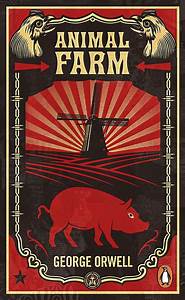
The pigs also use propaganda and rhetoric to create the illusion of freedom and democracy on Animal Farm. They make the other animals believe that they are free to make their own decisions and participate in the government, while in reality, the pigs control everything. The animals who speak out against the pigs or question their authority are silenced or punished. This creates a climate of fear and paranoia, where the animals are afraid to oppose the ruling class or express their opinions.
The Exploitation of Labor
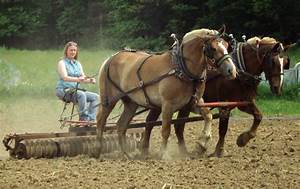
The pigs also exploit the labor of the other animals for their own benefit. They use the other animals’ hard work and dedication to build their own power and wealth, while giving little in return. The pigs justify this exploitation by claiming that they are the most intelligent and capable animals, and therefore deserve to enjoy the fruits of the other animals’ labor. This creates a situation where the other animals work tirelessly for the benefit of the ruling class, without receiving any real rewards or recognition.
The Corruption of Power
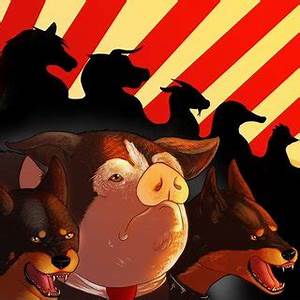
The pigs become corrupted by their power and privilege, and start to behave like the humans they once rebelled against. They become greedy, selfish, and cruel, and use their power to oppress and exploit the other animals. They also engage in acts of violence and repression to maintain their grip on power, such as executing those who oppose them or spreading lies and propaganda to manipulate the other animals. This creates a society that is far from the ideal of equality and justice that was promised at the beginning of the novel.
The Loss of Identity
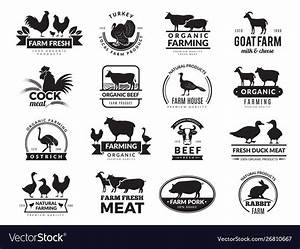
The other animals also lose their sense of identity and agency on Animal Farm. They become mere cogs in the machine of the ruling class, working tirelessly without any real purpose or direction. They also lose their ability to think critically and independently, as they are conditioned to follow the orders and dictates of the pigs. This creates a situation where the animals are stripped of their individuality and reduced to mere tools or instruments of the ruling class.
The Betrayal of the Revolution
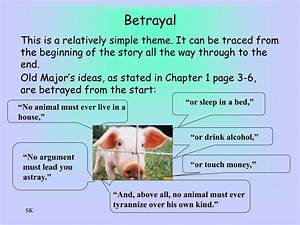
The ultimate tragedy of Animal Farm is that the revolution is betrayed and subverted by the very animals who initiated it. The pigs, who were supposed to be the vanguard of the revolution, become the new oppressors and perpetuate the same injustices and inequalities that existed before. The other animals, who had hoped for a better life and a brighter future, are left disillusioned and defeated, realizing that their efforts have been in vain.
The Lessons of Animal Farm
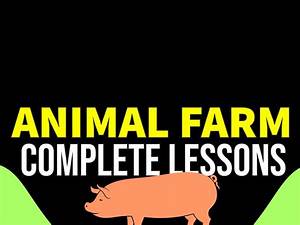
Animal Farm is a powerful allegory that teaches us important lessons about politics, power, and human nature. It shows us how easily revolutions can be subverted and corrupted, and how power can corrupt even the most well-intentioned leaders. It also shows us the dangers of propaganda, rhetoric, and manipulation, and the importance of critical thinking and independent judgment. By studying Animal Farm, we can learn how to recognize and resist oppression and exploitation, and how to work towards a more just and equitable society.
The Legacy of Animal Farm
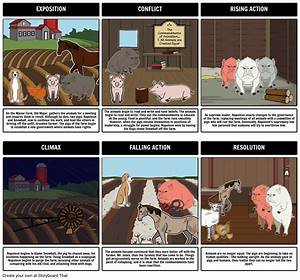
Animal Farm has become a classic of modern literature, and its legacy continues to inspire and educate readers around the world. It has been translated into many languages and adapted into various forms of media, including films, plays, and operas. Its themes and messages are as relevant today as they were when the novel was first published in 1945, and it remains a powerful critique of totalitarianism, dictatorship, and authoritarianism. By reading and studying Animal Farm, we can gain a deeper understanding of the complexities of political power and the challenges of creating a truly democratic and egalitarian society.
On Animal Farm, life is far from ideal. The struggle for basic needs such as food, water, and shelter is a daily battle that the animals must fight against the harsh conditions of the farm. Despite their hard work, they are still left wanting, with little to show for their efforts. The oppressive reign of the pigs only makes matters worse. They have established themselves as the ultimate authority, leaving the other animals without power and without a voice. Under Napoleon’s tyrannical leadership, Animal Farm has become an oppressive dictatorship where dissent is not tolerated. All the animals are forced to follow his commands, no matter how cruel or unjust they may be. This is a far cry from Old Major’s vision of a just and harmonious society, which has been completely distorted by the pigs. The principles that he taught to the animals have not been used to improve their lives, but rather to maintain the pigs’ hold on power. Isolated from the outside world, the animals have limited knowledge of what is going on beyond their boundaries, which means they are unable to make informed decisions about their future. The pigs have devised a system of labor that is highly unfair and exploitative. The animals who work the hardest get the least benefit, while the pigs who do the least work get all the benefits. Education, a vital tool for enabling individuals to have the skills, knowledge, and confidence to shape their own lives, is limited to a select few who use it to further their own interests. Violence and brutality are an ever-present reality on Animal Farm. The animals have been forced to endure beatings, torture, and executions as a means of maintaining the pigs’ power. Despite the animals’ belief that they have achieved freedom, freedom is ultimately a myth on Animal Farm. They are subjected to the will of the pigs who dictate every aspect of their lives. Living on Animal Farm is a hopeless existence for the animals. They are trapped in a system that works against them at every turn, with no way of changing their circumstances for the better. The sense of hopelessness that pervades life on Animal Farm is palpable and overwhelming. The animals are left feeling powerless and defeated, with little hope for a brighter future. In conclusion, life on Animal Farm is not as good as it could be. The struggle for basic needs and survival is a constant battle, while the oppressive reign of the pigs leaves the other animals without power or a voice. Napoleon’s dictatorship has turned Animal Farm into an oppressive regime where dissent is not tolerated. Old Major’s vision of a just and harmonious society has been betrayed, leaving the animals isolated from the outside world, subjected to unfair distribution of labor, lack of education, brutality and violence, absence of freedom, and a sense of hopelessness. Animal Farm may have started as a utopia, but it has devolved into a dystopian nightmare.
Once upon a time, on Animal Farm, life was supposed to be better. The animals had overthrown their human oppressors and established their own society based on the principles of equality and fairness. However, as time passed, it became clear that life was not as good on Animal Farm as they had hoped it would be.
From my point of view, there are several reasons why life is not as good on Animal Farm:
- The pigs have taken control: Despite the initial idea of equality, the pigs have taken control of Animal Farm and established themselves as the ruling class. They make all the decisions and reap the benefits of the other animals’ labor. The pigs have become corrupt and selfish, and their actions have led to widespread inequality on the farm.
- The animals are overworked and underfed: The pigs’ mismanagement has led to a shortage of food, and the animals are forced to work harder and longer to produce enough to eat. They are often hungry, tired, and exhausted, with no relief in sight.
- The animals are oppressed: The pigs use fear and intimidation to keep the other animals in line. They use violence to punish those who speak out or challenge their authority. The animals have no say in their own lives and are forced to obey the pigs’ every command, no matter how unreasonable or unfair it may be.
In conclusion, life on Animal Farm is not as good as it was supposed to be. The pigs have taken control, the animals are overworked and underfed, and they are oppressed and living in fear. The dream of a better life has turned into a nightmare, and the animals long for the days when they were free and equal. But for now, they must continue to live under the pigs’ rule and hope for a brighter future.
Dear visitors,
As you’ve read in our previous posts, Animal Farm is a dystopian novel that explores the dangers of totalitarianism and power-hungry leaders. However, it’s not only the political situation that makes life on Animal Farm difficult for its inhabitants. In this final post, we’ll discuss why life is not as good on Animal Farm compared to the utopia that was promised.
Firstly, the animals on Animal Farm may have gained their freedom from human oppression, but they still face struggles within their own community. The pigs, who were once allies in the rebellion, become corrupt and take advantage of their power. They manipulate the other animals into believing their lies and change the rules to benefit themselves. This creates a hierarchy where the pigs are at the top and the other animals, particularly the working class, are at the bottom. This unequal distribution of power leads to resentment and division among the animals, making life on Animal Farm far from ideal.
Secondly, the animals on Animal Farm are forced to work harder than they did before the revolution. Under Mr. Jones’s rule, they had to work long hours, but at least they received food and shelter. On Animal Farm, the animals are promised a better life, but they end up working longer hours and receiving less food. The pigs, who claim to be working for the common good, hoard the resources and give themselves special privileges. As a result, the other animals are constantly hungry and tired, and their living conditions deteriorate.
Finally, life on Animal Farm is not as good because the animals have lost their sense of community. Before the revolution, the animals worked together for a common goal and supported each other. However, after the pigs take over, they create an atmosphere of fear and suspicion. The animals are no longer united and are encouraged to spy on each other. This erodes the trust and camaraderie that once existed among them, leaving them isolated and vulnerable.
In conclusion, life on Animal Farm is not as good as it was promised to be. The animals may have gained their freedom, but they face new struggles under the corrupt leadership of the pigs. They work harder, receive less, and lose their sense of community. Animal Farm serves as a cautionary tale about the dangers of totalitarianism and the importance of remaining vigilant against those who seek to exploit our trust and loyalty.
Thank you for reading our blog series, and we hope it has given you insights into George Orwell’s masterpiece. Let us remember the lessons of Animal Farm and strive to create a better world for all.
.
Have you ever wondered why life is not as good on Animal Farm as it was promised to be? Here are some of the questions that people also ask:
1. Why did the pigs become corrupt?
The pigs became corrupt because they were given power and authority over the other animals. They took advantage of this power and became more interested in their own well-being than in the welfare of the others.
2. Why did the animals work so hard if they were promised a better life?
The animals worked hard because they believed that they would eventually have a better life. They were promised that they would no longer be oppressed by humans and that they would have more freedom and equality. However, the pigs gradually took over and made the animals work even harder than they did before.
3. Why did Boxer have to be sent to the knacker?
Boxer was sent to the knacker because he had become too old and weak to work. The pigs promised to take care of him and send him to a veterinarian, but instead they sold him for money.
4. Why did the animals allow the pigs to take over?
The animals allowed the pigs to take over because they believed that the pigs were working for their benefit. They trusted the pigs and did not realize that they were being manipulated and exploited.
5. Why did the animals rebel in the first place?
The animals rebelled because they were tired of being mistreated and oppressed by humans. They wanted a better life and more freedom. However, their rebellion was ultimately undermined by the corruption of the pigs.
Overall, the downfall of Animal Farm was due to the greed and corruption of the pigs. The animals were promised a better life, but their dreams were shattered by the very ones who claimed to be working for their benefit.






